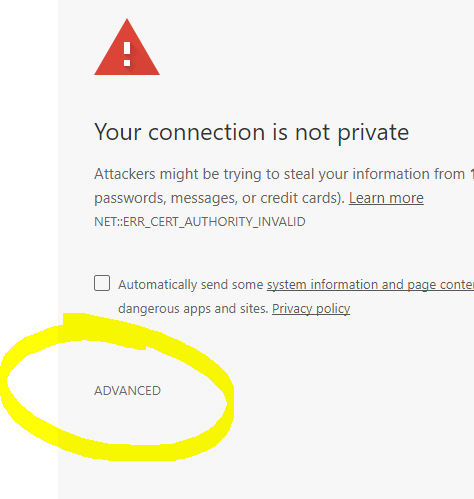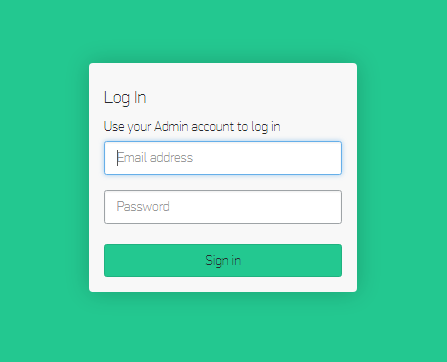@wanek … Thanks for your help.
But I had already setup everything regarding the blynk local server and everything is working fine too. Except I couldn’t access the admin_page (UI).
Kindly help me.
@wanek … Thanks for your help.
But I had already setup everything regarding the blynk local server and everything is working fine too. Except I couldn’t access the admin_page (UI).
Kindly help me.
Can you clarify “couldn’t access”… 404 error? Connection not private error? BSOD error? Smoke pouring out of the back of the PC error… etc.
If it is the “Your connection is not private error”, then that is normal, just click through until it allows you… In chrome you have to click on Advanced then “Proceed to …”
PS Local Server is an Advanced stage of Blynk… not an “Absolute beginner” stage ![]()
also it would be nice to know how did you tried to access?
@Gunner …
If it is the “Your connection is not private error”, then that is normal, just click through until it allows you… In chrome you have to click on Advanced then “Proceed to …”
I’m facing this error… I tried this thing what you had told several times. Still not working.
Could you please tell me, how i have to access the admin panel??
Please cross check my server.properties file.
First if your screen looks like this in the middle,

Then click on ADVANCED…
…then click on proceed, witch should take you to the Admin login

try this:
Please read the documentation in all the links above… you are using the wrong port, should be 9443 for the Admin page.
Sorry, I haven’t used MQTT so I am unfamiliar with any of it’s requirements… and thats a question for a different topic.
Have you successfully achieved the Admin page?
@Gunner this is my existing server.properties … please check it Sir.
Correct me if I need do any change!
#hardware mqtt port
hardware.mqtt.port=8440
#hardware ssl port
hardware.ssl.port=8441
#hardware plain tcp/ip port
hardware.default.port=8442
#http and web sockets port
http.port=8080
#https and web sockets port
https.port=9443
#application ssl port
app.ssl.port=8443
#address to bind to. by default bounded to all interfaces
listen.address=
#by default server uses embedded in jar cert to simplify local server installation.
#WARNNING DO NOT USE THIS CERTIFICATES ON PRODUCTION OR IN WHERE ENVIRNOMENTS REAL SECURITY REQUIRED.
#provide either full path to files either use '.' for specifying current directory. For instance "./myfile.crt"
server.ssl.cert=./server_embedded.crt
server.ssl.key=server_embedded.pem
server.ssl.key.pass=***********
#by default System.getProperty("java.io.tmpdir")/blynk used
data.folder=
#folder for logs.
logs.folder=./logs
#log debug level. trace|debug|info|error. Defines how precise logging will be.
log.level=info
#maximum number of devices allowed per account
user.devices.limit=25
#maximum number of tags allowed per account
user.tags.limit=100
#defines maximum allowed number of user dashboards. Needed to limit possible number of tokens.
user.dashboard.max.limit=100
#defines maximum allowed widget size in KBs as json string.
user.widget.max.size.limit=20
#user is limited with 100 messages per second.
user.message.quota.limit=100
#maximum allowed number of notification queue. Queue responsible for processing email, pushes, twits sending.
#Because of performance issue - those queue is processed in separate thread, this is required due
#to blocking nature of all above operations. Usually limit shouldn't be reached.
notifications.queue.limit=2000
#Number of threads for performing blocking operations - push, twits, emails, db queries.
#Recommended to hold this value low unless you have to perform a lot of blocking operations.
blocking.processor.thread.pool.limit=6
#this setting defines how often we can send mail/tweet/push or any other notification. Specified in seconds
notifications.frequency.user.quota.limit=15
#this setting defines how often we can send webhooks. Specified in miliseconds
webhooks.frequency.user.quota.limit=1000
#this setting defines how big could be response for webhook GET request. Specified in kbs
webhooks.response.size.limit=72
#maximum size of user profile in kb's
user.profile.max.size=128
#number of strings to store in terminal widget
terminal.strings.pool.size=25
#number of strings to store in map widget
map.strings.pool.size=25
#number of strings to store in lcd widget
lcd.strings.pool.size=6
#maximum number of rows allowed
table.rows.pool.size=100
#period in millis for saving all user DB to disk.
profile.save.worker.period=60000
#period in millis for saving stats to disk.
stats.print.worker.period=60000
#max size of web request in bytes, 256 kb (256x1024) is default
web.request.max.size=524288
#maximum number of points that are fetched during CSV export
#43200 == 60 * 24 * 30 - minutes points for 1 month
csv.export.data.points.max=43200
#specifies maximum period of time when hardware socket could be idle. After which
#socket will be closed due to non activity. In seconds. Default value 15 if not provided.
#leave it empty for infinity timeout
hard.socket.idle.timeout=15
#enable DB
enable.db=false
#enable raw data storage to DB
enable.raw.db.data.store=false
#size of async logger ring buffer. should be increased for loads >2-3k req/sec
async.logger.ring.buffer.size=2048
#initial amount of energy
initial.energy=100000
#ADMINISTRATION SECTION
admin.rootPath=https://192.168.42.43:8440/admin
#used for reset password page and certificate generation.
#by default current server IP is taken. could be replaced with more friendly hostname.
#it is recommended to override this property with your server IP to avoid possible problems of host resolving
server.host=test.blynk.cc
#email used for certificate registration, could be omitted in case you already specified it in mail.properties
contact.email=blynk.lpg@gmail.com
#network interface to determine server's current IP.
#only the first characters of the interface's name are needed.
#the default setting eth will use the first ethX interface found (i.e. eth0)
net.interface=eth
#comma separated list of administrator IPs. allow access to admin UI only for those IPs.
#you may set it for 0.0.0.0/0 to allow access for all.
#you may use CIDR notation. For instance, 192.168.0.53/24
allowed.administrator.ips=0.0.0.0/0
# default admin name and password. that will be created on initial server start
admin.email=admin@blynk.cc
admin.pass=admin
#comma separated list of users allowed to create accounts. leave it empty if no restriction required.
allowed.users.list=
SIR, PLEASE CHECK THIS ONE & HELP WITH SUGGESTIONS
I have already that Sir.
And yet you missed the correct port ![]() Read the entire topic.
Read the entire topic.
Assuming that this IS the correct IP for your Server, the Admin page should be accessable like this.
https://192.168.42.43:9443/admin
@Gunner … Sir, I changed it as per your instruction to 9443.
still the problem remains as such.
See the screenshot below Sir.
Then either your server (the java program) is not running or that is not the correct IP for the server hardware… we don’t know this stuff, as it is your network.
how do you know that your local server is actually running?
This is NOT the correct port!
The server is running properly because I can connect my blynk app and work with it using Arduino UNO.
Sir, please tell how to find ip for my server and my correct port
did you actually read any topic on this forum how to do this?
all was explained several times…
As per your request and my last post… You. Have. The. Wrong. Port. In. The. server.properties ![]()